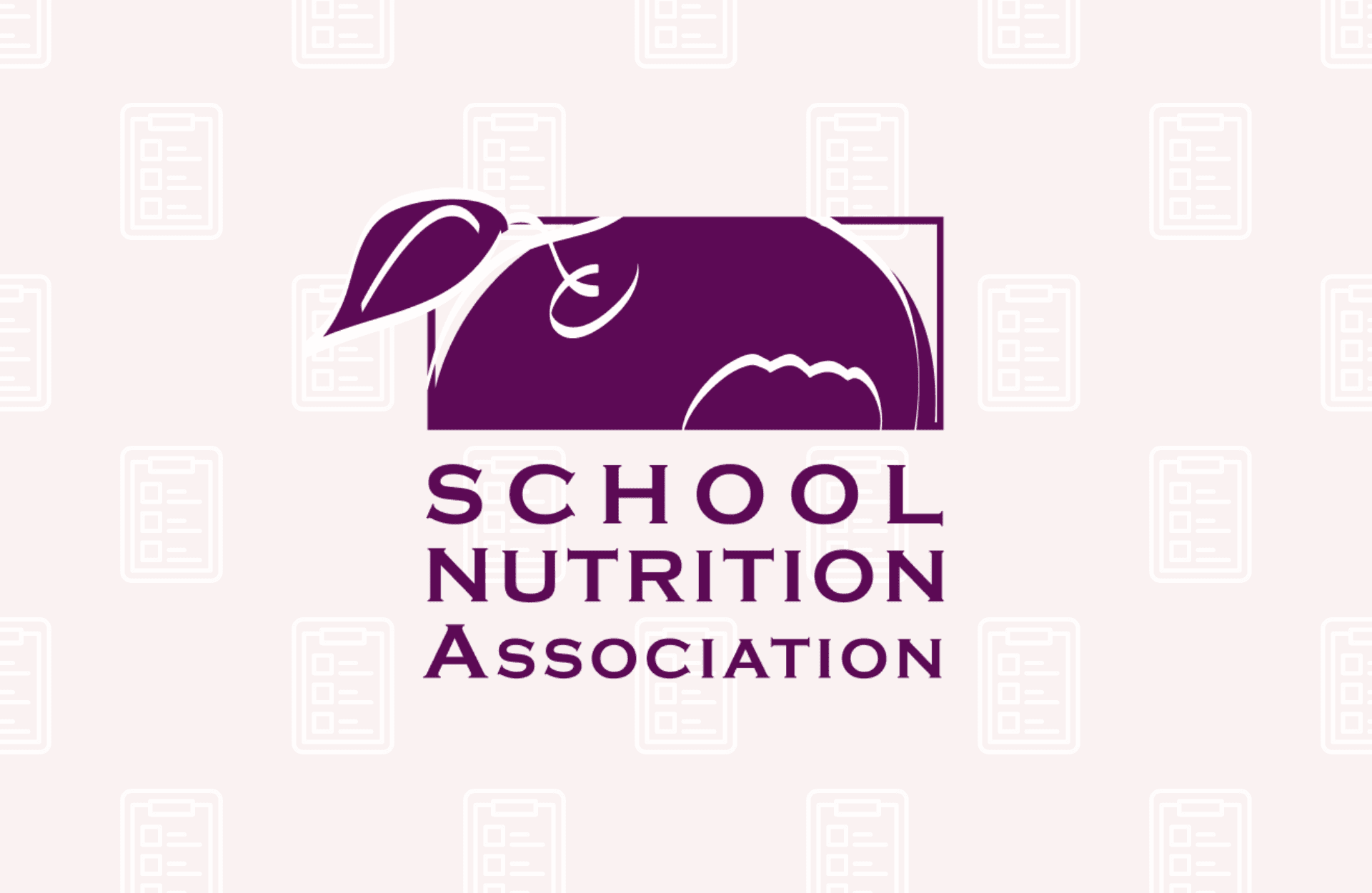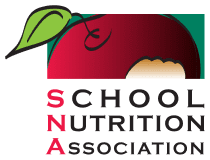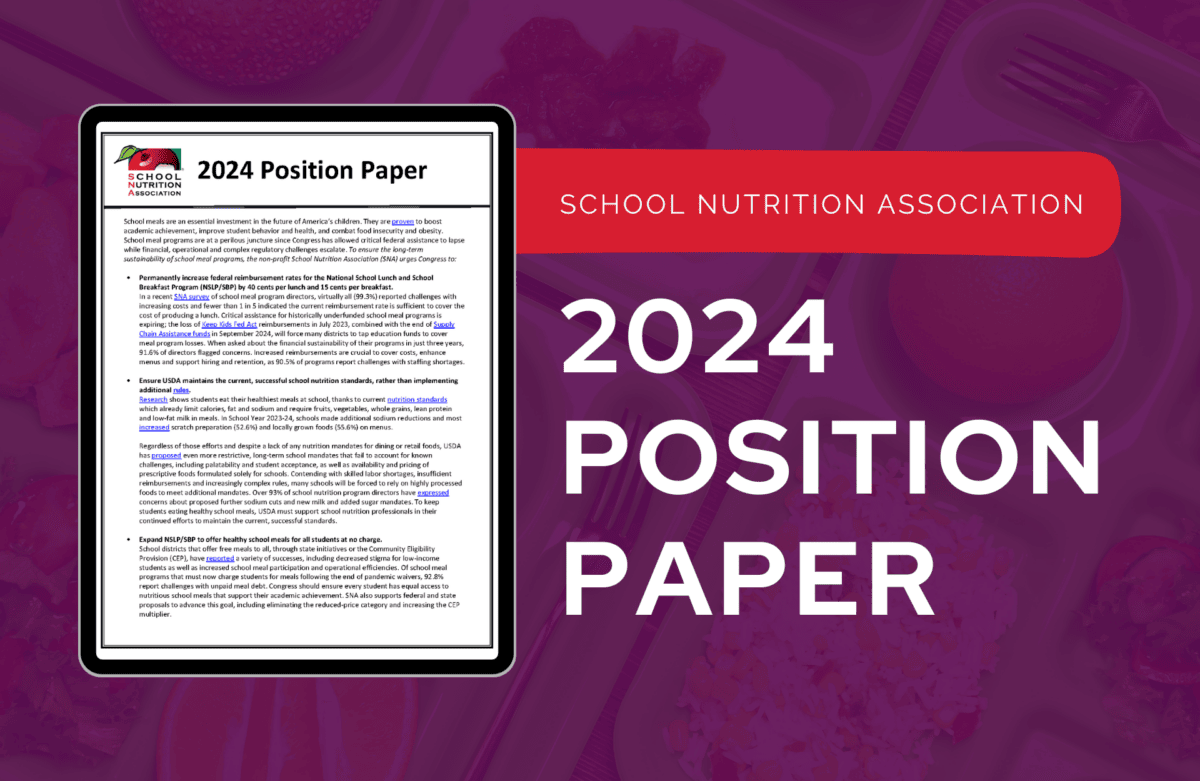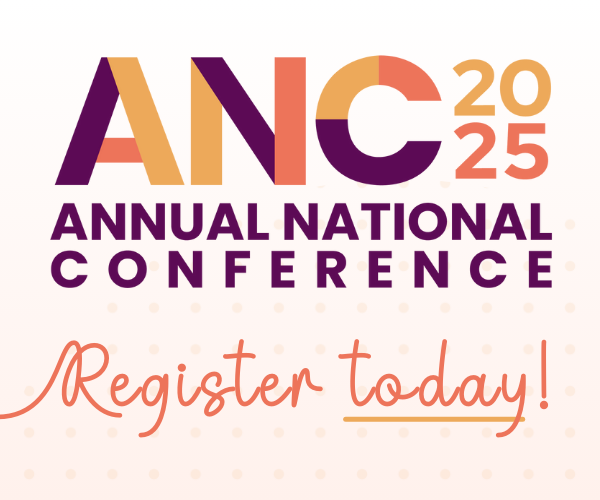Contact: Diane Pratt-Heavner, media@schoolnutrition.org
SNA Survey Finds School Meal Programs at a Perilous Juncture
2024-01-09
2024 Position Paper calls for increased federal support.
ARLINGTON, VA – A new School Nutrition Association (SNA) survey report reveals economic, procurement and regulatory issues have become critical long-term challenges for school meal programs as pandemic-era assistance comes to an end. With additional regulations for school meal programs being finalized by the U.S. Department of Agriculture (USDA), SNA’s 2024 Position Paper urges Congress to increase funding, preserve successful current nutrition standards and provide every student equal access to healthy school meals.
“Research shows students eat their healthiest meals at school, and school nutrition programs need Congress’ support to sustain that achievement. Inadequate funds and overly restrictive rules will soon cripple school meal programs,” said Chris Derico, SNS, School Nutrition Association President. “Federal reimbursements must account for the uniquely high cost of operating K-12 programs, which must procure more expensive low-sodium and whole grain foods to meet strict nutrition standards. Meanwhile, we believe all students deserve equal access to nutritious meals at school, and in schools that must charge for meals, we see inequities for children as well as unpaid meal debt increasing financial losses.”
SNA’s 2024 School Nutrition Trends Report details survey responses from 1,343 school meal program directors across the country. Virtually all respondents (99.3%) reported challenges with increasing costs (83.9% indicated costs are a significant challenge). With the last of pandemic funds expiring in September, school meal programs are ill-equipped to manage rising expenses:
- Just 17% of respondents indicated the current reimbursement rate is sufficient to cover the cost of producing a lunch.
- When asked about the financial sustainability of their programs in just three years, 91.6% of directors flagged concerns.
Insufficient reimbursements also limit schools’ capacity to offer competitive wages in a tight labor market and sufficiently staff kitchens to increase scratch cooking. Staff shortages was the second most prevalent challenge, reported by 90.5% of respondents.
The survey also revealed persistent procurement problems in the K-12 market. These findings are particularly worrying given proposed federal nutrition standards. USDA is scheduled to release final, much more restrictive, long-term rules for school meals in April 2024. With a lack of any nutrition mandates for dining or retail foods, limited demand for low-sodium and whole grain products in the retail market leaves many manufacturers and distributors hesitant to prepare and stock specialty items for K-12 customers. Respondents reported:
- Suppliers not carrying sufficient menu items needed to meet current nutrition standards (79.3%)
- Challenges with the availability of foods that meet current Target 1A sodium limits and are well accepted by students (90.4%)
- Concerns about proposed further sodium cuts and new milk and added sugar mandates (93% or more)
Although the severity of disruptions has eased slightly since SNA’s 2023 survey, large majorities of respondents continued to cite a wide variety of procurement issues, including:
- Menu item shortages (87.2%)
- Menu items discontinued (80.0%)
Student acceptance of school meals is critical to ensure food-insecure children are adequately nourished during the school day. Respondents reported a variety of menu improvements, such as adding choices (64.6%), increasing locally grown foods (55.6%) and conducting student taste tests (66.0%) to boost student acceptance of healthy options. Yet, preliminary USDA data indicates a continued drop in national Average Daily Lunch Participation since the implementation of nutrition standards.
Survey data shows that offering free school meals can help boost meal participation and benefit students. Among school districts with free meal service, through state initiatives or the Community Eligibility Provision (CEP):
- 87.4% reported free meal service increased school meal participation.
- 66.2% noted a more positive social-emotional cafeteria environment.
- 57.0% saw reduced stigma for low-income students.
- 52.7% cited increased operational efficiencies.
Among districts that must charge for school meals since the expiration of pandemic waivers, 92.8% reported challenges with unpaid meal debt. The overall reported median unpaid meal debt continues to climb compared to prior surveys, with median debt at $5,495 in November 2023 compared to $5,164 the year prior, up from $3,400 at the end of SY 2017-18.
Free and reduced-price meal application forms only collect income data, not expenses, so families struggling with high health care costs, rent increases or other family expenses may not qualify for meal benefits. Meanwhile, some families are hesitant to report personal information required on the application form.
- 90.1% of school meal programs that must charge for meals report challenges getting families to submit application forms.
To ensure the long-term sustainability of school meal programs and to keep students eating healthy school meals, SNA’s 2024 Position Paper urges Congress to increase federal school meal reimbursement rates, maintain current nutrition standards and offer healthy school meals to all students at no charge.
In March, school nutrition professionals from across the country will meet with their Members of Congress to discuss SNA’s 2024 Position Paper, as part of the 52nd annual Legislative Action Conference (LAC).
About School Nutrition Association:
The School Nutrition Association (SNA) is a national, non-profit professional organization representing 50,000 school nutrition professionals across the country. Founded in 1946, SNA and its members are dedicated to making healthy school meals and nutrition education available to all students. For more information on school meals, visit http://www.SchoolNutrition.org/SchoolMeals.
Related Articles

SNA Urges MAHA Commission to Invest in School Meals
Read More

School Nutrition Professionals to Implore Congress to Protect School Meals
Read More




